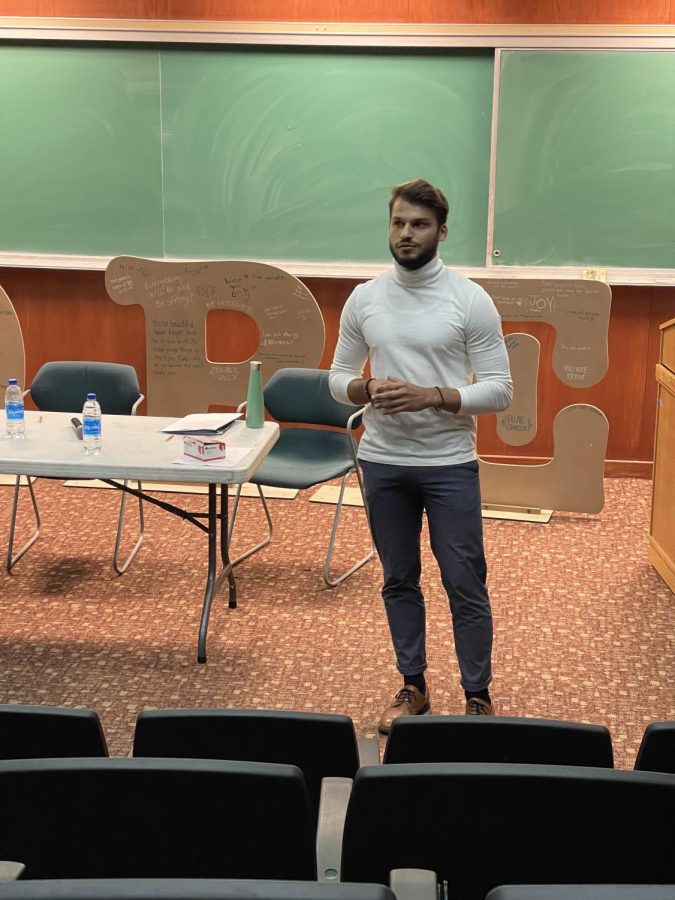‘Modern Masculinity’redfines manhood
Student-led panel by Active Minds shows vulnerability and transparency
October 19, 2021
Active Minds, the student-led mental health awareness group at Gannon University, held “Modern Masculinity,” an open panel that allowed men to be vulnerable and transparent about mental health, on Oct.5.
The panel was composed of six men, both Gannon students and faculty alike.
Georgios Koutroulis, a junior accounting and entrepreneurship major, was the primary planner of the panel. Koutroulis said that the event was designed to give men a safe place to be vulnerable in discussing mental health. This can help reduce the stigma surrounding mental health, which is especially prominent for men.
“We wanted to show everyone that men suffer too, which is OK and normal, and we wanted people to understand that men who talk about their issues aren’t weak, but rather strong,” Koutroulis said. “Men can support each other by sharing their experiences and letting each other know that it’s OK not to be OK.”
The Rev. Michael Kesicki, associate vice president of University Mission and Ministry and member of the panel, said that another way men can support each other is to be present and listen to one another.
“Speaking up about mental health is important to get the message out that no one needs to walk in the dark valley alone, but that there is someone ready to accompany us,” Kesicki said. “The more we speak up about this, the more the message may be reinforced that getting help is a mature and virtuous way to live.”
Men can support each other by applauding good behaviors related to mental health.
“We can take note of and encourage each other’s good habits that witness to self-care and avoid stereotypes that reinforce downplaying symptoms of anxiety or depression,” Kesicki said.
Koutroulis said that it is common for men to “suffer in silence” when it comes to mental illness. According to the National Institute of Mental Health, men with mental illnesses are less likely to seek treatment than women, but men are more likely to die by suicide.
“It is important to share your emotions and feelings with others when you go through hard times, because expressing your feelings is powerful and important,” Koutroulis said. “I hope that we were able to encourage people to talk about their mental health, and I hope that we were able to spread hope that depression is not a never-ending illness.”
Mikel-Bryan Ott, an accounting and sport management major, said that “suffering in silence” can also take a toll on one’s physical health and well-being.
“If you are constantly holding up a heavy shield to protect yourself and staying quiet about issues, after a while, your body is going to be tired from holding up that heavy shield all the time,” Ott said.
“Being open and vulnerable allows you to get help holding that shield, allowing you to rest. Even the strongest man or woman in the world has a weight they can’t lift where they will need a spotter to help them get it up.”
Kesicki also said that it is important for men to be open about mental health.
“Openness is the doorway to self-care and getting help from others,” Kesicki said.
“It means being self-aware and growing in courage to talk with trusted friends about the stuff going on inside of us. My hope is that we all left with the reassurance that it’s a good thing to have the conversation about mental health and that there are those in our lives who are willing to walk and talk with us to get us to a better place when we are not doing well.”
Ott said that it is important to be open and vulnerable, and not only to speak up for oneself but to be there for one another.
“It takes more strength and courage to open up than it does to just suck it up,” Ott said.
There is a particularly strong stigma surrounding the mental health of athletes, Koutroulis said. Many people expect athletes to be physically and emotionally tough, but athletes go through mental health struggles too.
“When I went through difficult times, listening to male athletes talk about their mental health was the most encouraging thing I did,” Koutroulis said. “I wanted to make sure that we had athletes on the panel so people see that even athletes have mental illnesses and struggles of all kinds.”
Kesicki also said that because athletes compete and perform under intense scrutiny, they can tend to focus on an image that others want from them rather than focusing on and affirming self-awareness and personal identity. While an athlete could easily feel that being open about interior burdens is a sign of weakness, it is actually a sign of courage and humility. Athletes encouraging openness and vulnerability from their peers is one of the best ways to get others to engage in the same behavior.
“Fellow athletes do more good by speaking up about mental health, as it is probably the most effective way to convince their peers that they are not alone, and that they have the interior grit to carry on in confident hope,” Kesicki said.
The fact that a man is an athlete or looks physically strong does not mean that e is incapable of undergoing mental suffering, Ott said.
“Just because one looks big and tough does not mean that bigness and toughness is protecting them from the darkness inside,” Ott said.
While men are less likely to talk about mental health or seek treatment for mental illness, it is still important for men and women to stand in solidarity and initiate a unified conversation surrounding the mental health of both men and women, Koutroulis said.
“Mental health affects both men and women and just because men’s mental health and women’s mental health have different stigmas does not mean that they are different or should be treated differently,” Koutroulis said. “So, since all genders have the same mental illnesses, they can talk about those struggles together and support each other.”
Women can be powerful allies, Ott said.
“Gender equality works both ways in the social norm, so it doesn’t always have to be the man who is the protector,” Ott said. “Women can be protectors also because they are equally as powerful.”
Katie Dickey, a senior social work major and president of Active Minds, said that support for mental health should have no gender.
“I think that people of all genders have the ability to listen to each other’s mental health stories and experiences, and really open their hearts up to what a ‘different way of doing things’ might look like,” Dickey said. “By being yourself and being willing to break the ‘status quo’ of what is expected from your gender in terms of vulnerability and emotions, you are paving a path for those who follow you to be their most authentic, healthy and peaceful selves.”
While the Gannon community and society at large are making improvements when it comes to vulnerability in conversations surrounding mental health, there is still a ways to go, Dickey said.
“I hope that the students, faculty and staff who attended this event took from it an understanding that our societal understanding of mental health and gender has an abundance of space left for growth, and that we all have a responsibility to partake in humble, honest and hopeful conversation about how we as a community want to operate,” Dickey said.
“By opening up a conversation about what it means to care about mental health as a modern man, Georgios really set an incredible example of what it means to be a new kind of strong.”
ANNA MALESIEWSKI






